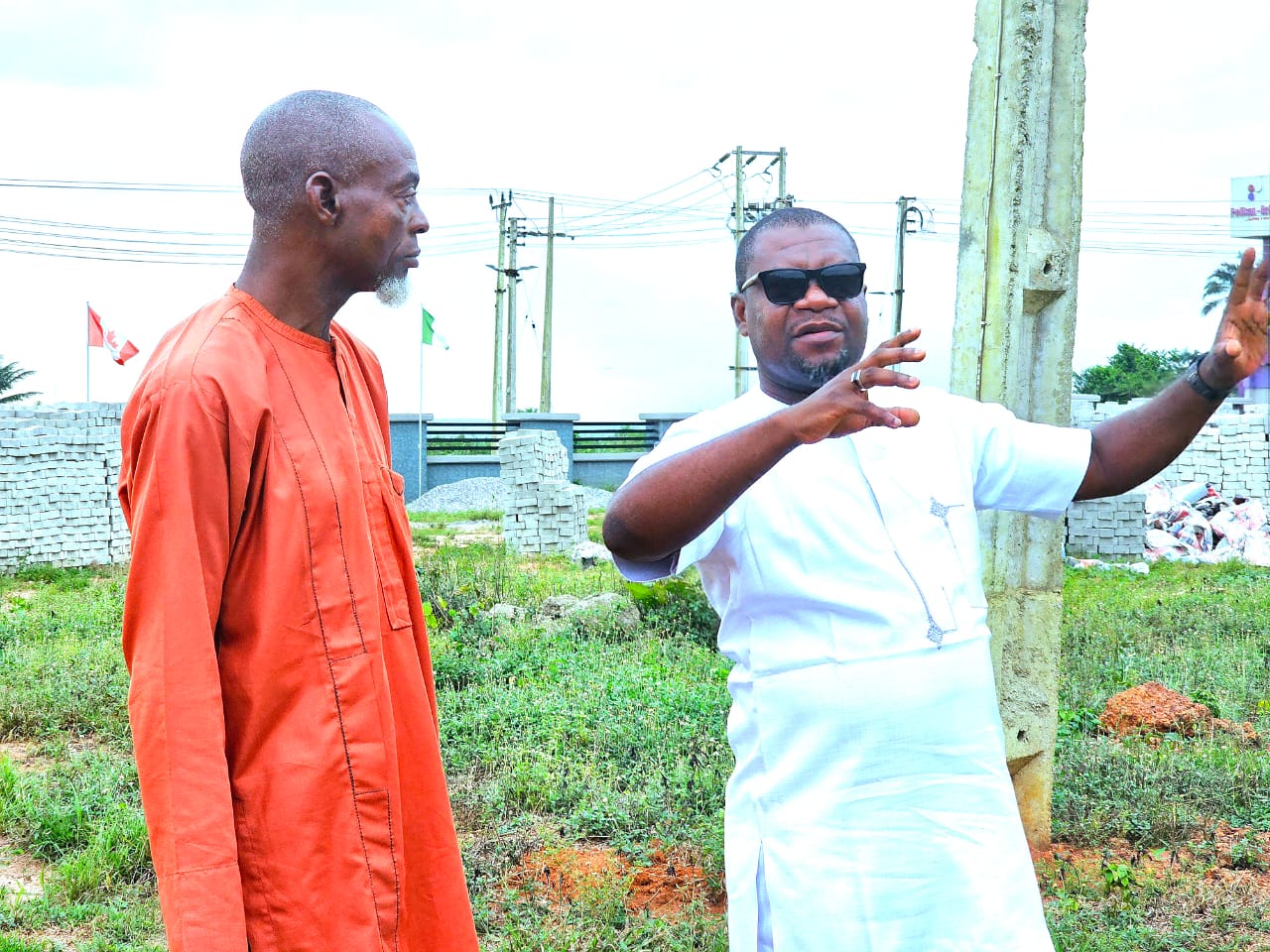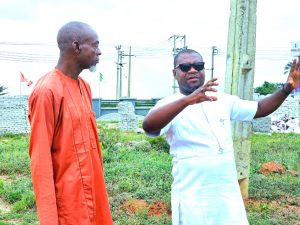society
Journalist Badmus Picks Second Address, Names It Bio-digester, Biogas Production

Journalist Badmus Picks Second Address, Names It Bio-digester, Biogas Production
… We’ll Use What We Have To Support Him, Pelican Valley CEO
Journalist Badmus has ventured into bio-digester technology and biogas production after about three decades of practice in the noble pen profession.
Badmus whose stint in the nation’s media industry traversed across The National Concord, Business Day among others, said his foray into biogas and bio-digester technology became necessary when it dawn in him that the in thing in the 21st Century is green environment which biogas production and bio-digester promote and support.
He said that biogas and bio-digester involved waste and sewerage management system that allows for recycling water and producing biogas by using environmentally friendly technology, explaining that it helps in conservation and serve as alternative source of power at affordable, durable and convenient way.
According to him, “if you don’t go green, you destroy yourself.”
He described journalism as a social service which does not bring millions or billions of naira to the practitioners, saying if one wants to practice it with integrity as a watch dog and potent voice to hold the three arms of government accountable to the people, one must have a second address to lean on in order to overcome temptations from the “oppressors” in government.
Badmus spoke to our reporter shortly after a guided tour of the Pelican Brief Estate and Pelican Ecostay Apartments situating at Masa – Kobape corridor of Ogun State, where a leading real estate firm – Pelican Valley Nigeria Limited, is working to ignite an eco – friendly and zero – carbon emission ‘Smart City’ and ‘Knowledge base’ of the state.
He lauded the man behind the novel project, realtor Babatunde Adeyemo, for his ingenuity, creativity and commitment to the green environment through the Ecostay apartments concept, it would promote good health and longevity in guests, tourists and residents of the planned facilities.
“The location is rare creativity and outright ingenuity. The layout, the settings, upcoming homes and the calibre of people that are to reside here and the naturalness of the environment showed they are on track based on the concept of ecostay.
“The in thing in the 21st century is green environment. If you don’t go green, you destroy yourself. You exchange with plant when plants releases oxygen as its waste, you imbibe oxygen for your own life and when you releases Carbon-dioxide as your waste, plants pick it for food production (photosynthesis). So the initiator got it right by calling it Ecostay. Even with air conditional you can’t compare it with natural air from God.” he said.
Speaking extensively on the biogas, bio-digester and the critical role Mr Badmus is expected to play in Pelican Valley’s scheme of things towards achieving eco- friendly Ecostay Apartments as well as the opportunity created about 25 years ago by former governor Aremo Olusegun Osoba which made the area a suitable location for the planned Smart City, the CEO of Pelican Valley Nigeria Limited, Ambassador Adeyemo said, “From the word ecostay you can see that we are really working towards making the environment friendly, and free from carbon emission. In furtherance of that, we brought in Mr Badmus, a colleague a brother and a friend who also has a second address like me, we have tested him at Pelican Valley. He has delivered and he has just concluded a Bio-digester for us at Pelican Valley Estate. I used that as a testing ground for him, and having delivered on that, I now bring him down to Ecostay Apartments and Pelican Brief Estate where we want to ignite a smart city and where we want luxury to meet nature.
“We are combining two things here and we want it to be as natural as possible, instead of us digging a suck away, thereby degrading the environment, we are looking at a bio digester, which can also be converted to biogas to generate electricity. You can see that we have already gotten 500kva transformer, they are fully energized and connected to 33KVA trunk line, that supplies us about 20-22hours electricity per day.
“We just need an alternative power supply that can cover for the remaining 2 or 3 hours averagely. We are also looking at the direction of solar-inverter, then bio digester to bio gas. We want here to be 100percent eco -friendly. It is a well laid out environment, we have a place we can use for lounge, restaurant and we are trying to get about two or three camels, donkeys, we are also looking for peacocks just to create a natural ambience.
“I always like to explore what is around me first. Taking a journalist who is a senior colleague and also the issue most journalists have is that we have the trumpet but we don’t blow it, it is very quite unfortunate, we have been together for almost quite 20years, i never knew that he is into bio digester and bio gas untill recently. I was marveled to know that, so this man is a bundle of talent and creativity like this and he’s not making noise about it.
“Now that we have discovered him, we will put all we have to encourage him. Look at what is happening here, developing here goes beyond Babatunde Adeyemo, i don’t think i can finish developing this place. We are trying to ignite a smart city here. The development here is a continuous project. In the next 30-40 years my children will still add value to what we are doing here,God’swilling.
“Where we are standing exactly is where we want to develop our cooperate headquarters, we are going to have a F. M Radio station here, people like Mr Badmus and people that are fulfilled in their profession will have one or two radio programmes to enlighten people here. We are going to have a Pelican Office here to Gods willing, one of the floors is going to be for Oko Opo Foundation, that’s my NGO that I will be launching soon. So we are going to have a lot of activities here.
By the grace of God, in the next few months, I want to invite the former Governor of Ogun State, Aremo Olusegun Osoba, to commission something here because this is part of his handiwork, without him dragging the 35KVA electricity line from the main road to this place I would not have been privileged to have this estate here. Chief Osoba created an opportunity about 25 years ago and one Dr. Babatunde Adeyemo is taking full advantage of that opportunity now.
“We are also planning to appeal to the incumbent governor, Prince Dapo Abiodun, to honour us with his presence to see what God has been using us to achieve. This is a generational project.
I am really excited to have somebody that has the expertise that could stand the test of time that we need here. We have so many people doing the biogas and bio-digester work but we will want to partner Badmus. He is like our own blood. He is a journalist, he is my family. i will use my power to encourage my colleagues who are already on the part of second addresses.
“I want to encourage other journalists to have a second address and that is why we are collaborating with NUJ to provide some funds with no interest, we will lend to those that already have second address to add to whatever they are doing and when they refund it, we will lend to others. We are doing it for charity God’s willing, we are not expecting extra income or revenue from that. We are going to support Badmus, we just need to push him more to propel his action for future growth and development of our immediate constituency and the nation in general”
society
Ramadan: Adron Homes Felicitates Muslims, Preaches Hope and Unity

Ramadan: Adron Homes Felicitates Muslims, Preaches Hope and Unity
Adron Homes & Properties Limited has congratulated Muslim faithful on the commencement of the holy month of Ramadan, urging Nigerians to embrace the virtues of sacrifice, discipline, and compassion that define the season.
In a statement made available to journalists, the company described Ramadan as a period of deep reflection, spiritual renewal, and strengthened devotion to faith and humanity.
According to the management, the holy month represents values that align with the organisation’s commitment to integrity, resilience, and community development.
“Ramadan is a time that teaches patience, generosity, and selflessness. As our Muslim customers and partners begin the fast, we pray that their sacrifices are accepted and that the season brings peace, joy, and renewed hope to their homes and the nation at large,” the statement read.
The firm reaffirmed its dedication to providing affordable and accessible housing solutions to Nigerians, noting that building homes goes beyond structures to creating environments where families can thrive.
Adron Homes further urged citizens to use the period to pray for national unity, economic stability, and sustainable growth.
It wished all Muslim faithful a spiritually fulfilling Ramadan.
Ramadan Mubarak.
society
Underfunding National Security: Envelope Budgeting Fails Nigeria’s Defence By George Omagbemi Sylvester

Underfunding National Security: Envelope Budgeting Fails Nigeria’s Defence
By George Omagbemi Sylvester | Published by saharaweeklyng.com
“Fiscal Rigidity in a Time of Crisis: Lawmakers Say Fixed Budget Ceilings Are Crippling Nigeria’s Fight Against Insurgency, Banditry, and Organized Crime.”
Nigeria’s legislature has issued a stark warning: the envelope budgeting system; a fiscal model that caps spending for ministries, departments, and agencies (MDAs) is inadequate to meet the country’s escalating security challenges. Lawmakers and budget analysts argue that rigid fiscal ceilings are undermining the nation’s ability to confront insurgency, banditry, kidnapping, separatist violence, oil theft and maritime insecurity.
The warning emerged during the 2026 budget defence session for the Office of the National Security Adviser (ONSA) at the National Assembly in Abuja. Senator Yahaya Abdullahi (APC‑Kebbi North), chairman of the Senate Committee on National Security and Intelligence, decried the envelope system, noting that security agencies “have been subject to the vagaries of the envelope system rather than to genuine needs and requirements.” The committee highlighted non-release or partial release of capital funds from previous budgets, which has hindered procurement, intelligence and operational capacity.
Nigeria faces a multi‑front security crisis: persistent insurgency in the North‑East, banditry and kidnappings across the North‑West and North‑Central, separatist tensions in the South‑East, and piracy affecting Niger Delta oil production. Despite declarations of a national security emergency by President Bola Tinubu, lawmakers point to a “disconnect” between rhetoric and the actual fiscal support for agencies tasked with enforcement.
Experts warn that security operations demand flexibility and rapid resource allocation. Dr. Amina Bello, a public finance specialist, said: “A static budget in a dynamic threat environment is like sending firefighters with water jugs to a forest fire. You need flexibility, not fixed ceilings, to adapt to unforeseen developments.”
The Permanent Secretary of Special Services at ONSA, Mohammed Sanusi, detailed operational consequences: irregular overhead releases, unfulfilled capital appropriations, and constrained foreign service funds. These fiscal constraints have weakened intelligence and covert units, hampering surveillance, cyber‑security, counter‑terrorism and intelligence sharing.
Delayed capital releases have stalled critical projects, including infrastructure upgrades and surveillance systems. Professor Kolawole Adeyemi, a governance expert, emphasized that “budgeting for security must allow for rapid reallocation in response to threats that move faster than political cycles. Envelope budgeting lacks this essential flexibility.”
While the National Assembly advocates fiscal discipline, lawmakers stress that security funding requires strategic responsiveness. Speaker Abbas Ibrahim underscored that security deserves “prominent and sustained attention” in the 2026 budget, balancing oversight with operational needs.
In response, the Senate committee plans to pursue reforms, including collaboration with the executive to restructure funding, explore supplementary budgets and ensure predictable and sufficient resources for security agencies. Experts warn that without reform, criminal networks will exploit these gaps, eroding public trust.
As one policy analyst summarized: “A nation declares a security emergency; but if its budget does not follow with real resources and oversight, the emergency remains rhetorical.” Nigeria’s debate over envelope budgeting is more than an accounting dispute; it is a contest over the nation’s security priorities and its commitment to safeguarding citizens.
society
Rev. Mother Kehinde Osoba (Eritosin) Celebrates as She Marks Her Birthday

Rev. Mother Kehinde Osoba (Eritosin) Celebrates as She Marks Her Birthday
Today, the world and the body of Christ rise in celebration of a rare vessel of honour, Rev. Mother Kehinde Osoba, fondly known as Eritosin, as she marks her birthday.
Born a special child with a divine mark of grace, Rev. Mother Eritosin’s journey in God’s vineyard spans several decades of steadfast service, spiritual depth, and undeniable impact. Those who know her closely describe her as a prophetess with a heart of gold — a woman whose calling is not worn as a title, but lived daily through compassion, discipline, humility, and unwavering faith.
From her early days in ministry, she has touched lives across communities, offering spiritual guidance, prophetic insight, and motherly counsel. Many testify that through her prayers and teachings, they encountered God in a deeply personal and transformative way. Near and far, her influence continues to echo — not only within church walls, but in homes, families, and destinies reshaped through her mentorship.
A mother in every sense of the word, Rev. Mother Kehinde Osoba embodies nurture and correction in equal measure. As a grandmother, she remains energetic in purpose — accommodating the wayward, embracing the rejected, and holding firmly to the belief that no soul is beyond redemption. Her life’s mission has remained consistent: to lead many to Christ and guide them into the light of a new beginning.
Deeply rooted within the C&S Unification, she stands tall as a spiritual pillar in the Cherubim and Seraphim Church globally. Her dedication to holiness, unity, and prophetic service has earned her widespread respect as a spiritual matriarch whose voice carries both authority and humility.
As she celebrates another year today, tributes continue to pour in from spiritual sons and daughters, church leaders, and admirers who see in her a living reflection of grace in action.
Prayer for Rev. Mother Kehinde Osoba (Eritosin)
May the Almighty God, who called you from birth and anointed you for His service, continually strengthen you with divine health and renewed vigour.
May your oil never run dry, and may your prophetic mantle grow heavier with greater glory.
May the lives you have nurtured rise to call you blessed.
May your latter years be greater than the former, filled with peace, honour, and the visible rewards of your labour in God’s vineyard.
May heaven continually back your prayers, and may your light shine brighter across nations.
Happy Birthday to a true Mother in Israel — Rev. Mother Kehinde Osoba (Eritosin).
More years.
More anointing.
More impact.
If you want this adapted for a newspaper page, church bulletin, Facebook post, or birthday flyer, just tell me the format and tone.
-

 celebrity radar - gossips6 months ago
celebrity radar - gossips6 months agoWhy Babangida’s Hilltop Home Became Nigeria’s Political “Mecca”
-

 society6 months ago
society6 months agoPower is a Loan, Not a Possession: The Sacred Duty of Planting People
-

 society5 months ago
society5 months agoReligion: Africa’s Oldest Weapon of Enslavement and the Forgotten Truth
-

 news6 months ago
news6 months agoTHE APPOINTMENT OF WASIU AYINDE BY THE FEDERAL GOVERNMENT AS AN AMBASSADOR SOUNDS EMBARRASSING












